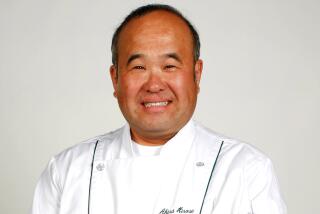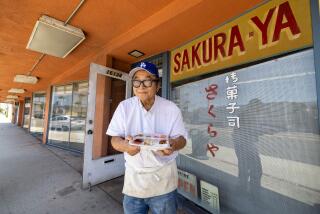John Y. Naka, 89; Brought Art of Asian Bonsai to the West
John Yoshio Naka, the world-renowned bonsai master who was credited with bringing the art to Western culture, has died. He was 89.
Naka, a resident of Whittier, died Wednesday at Whittier Hospital Medical Center. The cause of death was not announced.
Naka was widely regarded as one of the greatest bonsai masters of his time, even in Japan.
The Japanese art that dates back to the 13th century -- though it originated in China several centuries before -- involves dwarfing and shaping miniature trees and shrubs with wire and careful pruning. Naka’s talent was to create landscapes, such as his remarkable Goshin, which means “protector of the spirit.” It is a forest of 11 juniper trees, each representing a grandchild. It took 55 years for Naka to grow it.
In 1990, the U.S. National Arboretum in Washington, D.C., dedicated the John Y. Naka Bonsai Pavilion, a collection of trees from bonsai masters around the world. Naka’s Goshin has a place of honor there.
Naka was awarded dozens of honors for his work and for his willingness to teach the art to people of all nations and cultures.
In 1985, Emperor Hirohito of Japan granted Naka the 5th Class Order of the Rising Sun, the nation’s highest honor conferred to noncitizens.
Naka and four other bonsai enthusiasts founded the California Bonsai Society; he served as president for 32 years. He taught his final classes in 1992 at the California Bonsai Society convention in Irvine.
His definitive books on the art, “Bonsai Techniques I” and “Bonsai Techniques II,” have been translated into five languages.
Naka was probably best known for his willingness to teach the art to anyone who wanted to learn it. He and his wife frequently opened their Whittier home to students and visitors who wanted to view the bonsai garden in their backyard. Some of the trees fashioned by Naka were more than 60 years old. But he was sensitive about the age of his trees, saying it was “like asking an old woman her age.”
“He was the greatest teacher,” said Doug Acker of Phoenix, who met Naka 25 years ago at a workshop in Los Angeles. Acker said that at the time, many of the bonsai clubs were exclusive gatherings of older Japanese men and classes were taught in Japanese -- if they were taught to Westerners at all.
“John changed that. He made it accessible to everybody,” Acker said. “He never held anything back. He wanted everybody to know what he knew.”
Naka was born Aug. 14, 1914, the last of three children to Japanese immigrants in the farming community of Fort Lupton, Colo. When Naka’s grandmother died, Naka, then 8, and his family returned to their hometown of Kurume, Japan, to care for his grandfather.
It was Naka’s grandfather, Sadehei, who introduced his young grandson to bonsai. He would take Naka for walks in the woods and allow the boy to watch him trim and shape trees. Later, Naka was allowed to water and pull weeds for his grandfather.
According to the Phoenix Bonsai Society, Naka’s grandfather one day picked up a tiny pine in a pot and said, “Yoshio, how about making something out of this?”
But when he tossed the tree to the boy, Naka dropped it and the tree’s branches broke, leaving the boy in tears. His grandfather handed the tree to Naka, saying, “Start at that point.”
At age 21, Naka returned to Colorado to work on his brother’s farm, and in 1936 he married Alice Toshito Mizunaga. Tired of Colorado’s harsh winters, he and his wife moved to Los Angeles in 1946, where he opened and operated a landscaping business.
Naka honed his skills at bonsai -- meaning “tree in a container” -- working with other bonsai masters until he developed a strong reputation. Eventually, Naka would teach hundreds of people bonsai through workshops and conventions and classes held around the world.
He would not, however, teach in Japan, saying it would be like “trying to preach to Buddha.”
In addition to his wife, Naka is survived by his three sons, Eugene of Whittier, Robert of Torrance and Richard of Los Angeles; 12 grandchildren; and seven great-grandchildren.
A memorial service is planned for Tuesday at 7:30 p.m. at the Higashi Honganji Buddhist Temple in Los Angeles.
Instead of flowers, the family requests that donations be sent to the John Naka Memorial Fund at the National Bonsai Foundation, 3501 New York Ave. N.E., Washington, D.C., 20002.


